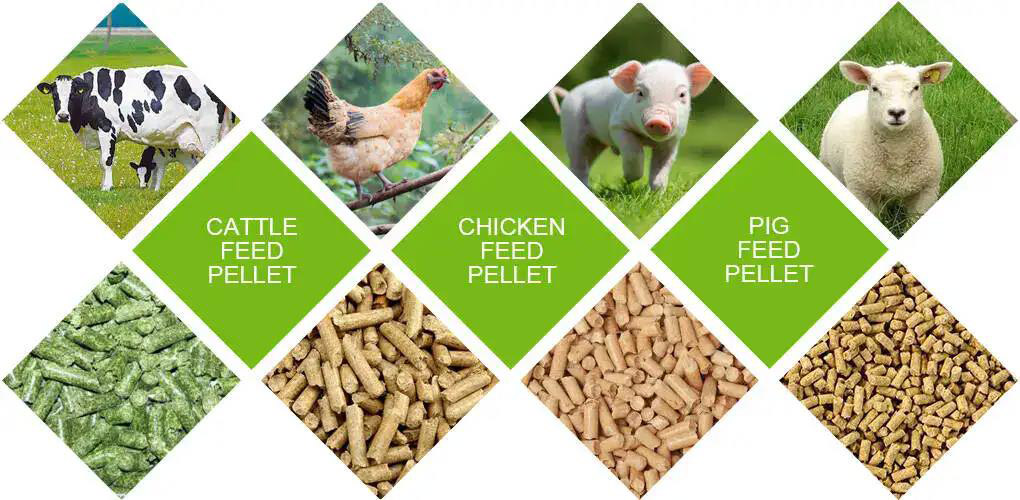horse feed production line
A horse feed production line is a set of equipment and systems specifically designed to produce feed suitable for equine consumption
horse feed production line Introduction
A horse feed production lines is a set of equipment and systems specifically designed to produce feed suitable for equine consumption. This production line typically includes a series of processing steps, including raw material processing, mixing, pelleting, crushing, drying, cooling, packaging, and more. The design and configuration of a horse feed production line can be adjusted and optimized based on the nutritional requirements, growth stages, breeds, and specific needs of horses.
These production lines typically employ automated and continuous production methods to enhance production efficiency and product quality. The scale and capacity of the production line can vary depending on different production and market demands, ranging from small-scale feed production lines to large-scale industrial-grade ones. The primary goal of a horse feed production lines is to produce high-quality, nutritionally balanced feed products that meet the needs and health standards of horses.

Horse feed production line
Customized Formulations
Tailored formulations to meet the specific nutritional requirements of horses, considering factors such as age, breed, activity level, and health status.
Ingredient Quality Control
Rigorous control over the quality of ingredients to ensure they meet safety standards and provide the necessary nutrients for horse health.
Automated Processing
Utilization of automated processing equipment and systems to improve efficiency and consistency in feed production.
Flexibility in Production
Ability to produce various types of feed, including pellets, cubes, and textured feeds, allowing for versatility in meeting horse preferences and dietary needs.
Nutritional Balance
Emphasis on achieving a balanced nutritional profile in the feed, including essential vitamins, minerals, proteins, carbohydrates, and fats to support horse health and performance.
Packaging Options
Offerings of different packaging options, such as bags, totes, or bulk, to accommodate various distribution channels and customer preferences.
Quality Assurance
Implementation of quality control measures throughout the production process to ensure the safety, consistency, and integrity of the feed products.
Traceability
Tracking systems to trace the origin of ingredients and monitor production processes, allowing for accountability and quality assurance.
Environmental Considerations
Adherence to environmental regulations and sustainability practices to minimize waste and environmental impact associated with feed production.
Safety Standards
Compliance with safety standards and regulations to ensure the health and well-being of both horses and humans involved in the production process.

Structure of horse feed production line
Raw Material Receiving and Storage System
Used for receiving and storing various feed ingredients, such as grains, protein sources, minerals, and vitamins.
Crusher
Crushes large pieces of raw materials such as corn, beans, etc., into suitable sizes for processing and mixing.
Batching System
Based on the nutritional requirements of horses, different ingredients are proportionally mixed according to specific ratios.
Mixer
Mixes the proportioned raw materials evenly to ensure a balanced nutritional composition.
Pelletizer
Forms the mixed raw materials into pellet shapes for easy digestion and absorption by horses.
Cooling System
Cools the pellets after pelletizing to stabilize the nutritional and physical properties of the pellets.
Screening Machine
Screens out uniformly sized feed particles and removes any defective particles.
Packaging System
Automatically weighs and packages the finished feed pellets for storage and transportation.
Conveyor System
Effectively transports raw materials and finished products between different sections of the production line.
Control System
An automated control system that monitors the operation status of the entire production line.
The specific configuration and design of these components are customized based on the scale, capacity, degree of automation, and specific process requirements of the horse feed production lines.

Advantages of Horse Feed Production Line
Customized production
Tailoring feed production to meet the specific nutritional needs of different breeds, growth stages, and health conditions of horses.
Selection of high-quality ingredients
Choosing high-quality ingredients and ensuring feed quality and safety through strict quality control.
Automated processing
Utilizing automated production equipment and systems to increase production efficiency, reduce labor costs, and ensure production consistency.
Balanced nutrition
Ensuring a balanced distribution of various nutrients in the feed through precise ingredient selection and mixing to meet the physiological needs of horses.
Easy digestion and absorption
Producing feed in pellet form that is easy for horses to digest and absorb, thereby improving nutrient utilization.
Product stability
Strict quality control and production standards ensure the stability and consistency of feed products.
Convenient packaging
Using automated packaging systems for convenient storage, transportation, and use.
Environmental friendliness
Adopting energy-saving and environmentally friendly production processes and equipment to reduce resource waste and environmental pollution.
Safety and reliability
Strict production management and quality inspection ensure the safety and reliability of feed products, safeguarding the health of horses.
Application of Horse Feed Production Line
Typically, the production of Horse feed production lines uses raw materials such as corn, soybeans, wheat, and other nutrients as the formula. Our feed pellet machine are specially used to produce feed for poultry, livestock, pigs, horses, cattle, sheep, chickens, ducks, goose and other animals.For different animals, with different growth cycles, (chicks, suckling pigs, calves, etc.), the feed pellet size required is different, but our feed production lines only needs to replace ring molds with different apertures or use a pellet crumbler to reach the required size.
(Similar news:What Is The Application Of Horse Feed Production Line>>)

After-sale Service
- – HKB provides advanced grain safety storage technology to assure your grain silo 100% quality stability.
- – grain silo Quality guarantee is one year after installation and commissioning or 18 months after leaving China Port. Maturity is the first.
- – 7 days x 24 hours service, within 24 hours reply/solve of any technical issues upon request.
- – Routinely telephone track to remove all might be problems grain silo or issues guarantying the whole system grain silo long-lasting safety and reliability.
- – HKB will consider all other needs like customs clearance, sea delivery, insurance, customs tax benefit plan, documentation, etc. So our respected Users feel so relaxed and easy to get the grain silo system well.








